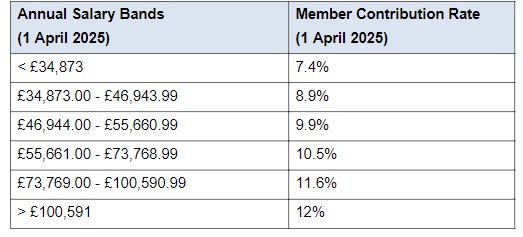The government will increase teachers’ pension contributions – the first since 2015 – despite concerns over the “financial impact” on staff.
Last year, the Department for Education consulted on plans to raise contributions for teachers earning the most to avoid a shortfall in the fund.
The changes have now been ratified and will come into effect on April 1.
Teachers earning less than £34,873 will not be impacted – with their pension contribution remaining at 7.4 per cent.
But a teacher on £50,000 will pay an extra £10 a month or £120 a year, and someone on £110,000 would pay an extra £17 a month, or £198 a year (see tables below).


It comes after the last government increased the contribution schools and colleges have to make from 23.6 per cent to 28.6 per cent.
In last year’s consultation, the DfE explained the six “contribution tier” rates had remained the same since 2015, but the thresholds at which each rate is paid had increased annually in line with inflation.
Unions raise ‘financial impact’ concerns
As a result, the “estimated yield” from the current structure is now 9.45 per cent, whereas members are “required collectively to contribute 9.6 per cent across the whole scheme membership”.
This is “primarily because of the member contribution tier thresholds increasing at a higher rate (based on CPI) than average salary growth, which has affected the expected distribution of the membership in the contribution tiers”.
The DfE said it had accepted a “unanimous recommendation” from the Government Actuary’s Department and TPS advisory board “to retain the current six-tier structure with the forecast shortfall met by an increase of 0.3 percentage points for tiers 2-6”.
The government received 187 responses to the consultation. Just under half backed the plans, including most unions.
But “several … expressed concerns about the adjustment of the member contribution rates, citing the financial impact”, and about the rise causing more teachers to drop out.
Some respondents said teachers should be “given the option to decide what percentage of their pay they want to contribute to their pension”.
Government said opt-out rates remain “stable”, but they will monitor the figures. They also said their “tiered” approach to raising contributions is “fair and justified”.
On impact by gender, government added: “Inevitably, more females will be affected by this change as females make up a higher proportion of the membership.
“There tends to be a higher proportion of male members, compared to the overall proportion of the membership, in the higher salary bands and therefore the Department does not believe that older female members are unfairly impacted by this change.”
New Fair Deal extended to colleges
The government has also confirmed it will extend generous public pensions to college staff who are compulsorily transferred to private sector companies.
The application of the New Fair Deal, a non-statutory policy, means private companies that take on college contracts for services such as cleaning, catering, facilities management or IT have to honour some of the country’s most generous pension contributions to college staff transferred to them.
Unions wanted the government to apply the policy retrospectively from the point that colleges were reclassified as public sector bodies in November 2022.
The Department for Education said today that it will amend the Teachers’ Pension Scheme (TPS) so that the policy applies to “employees of FE establishments who are already members (or eligible to be members) of the TPS and whose contract transfers to a new employer after 14 November 2024”.
“This will allow those members to retain access to the scheme while they remain employed on that same public service contract,” the consultation response added.
Treasury said that applying the policy from November 2024 “strikes the right balance between the consistent application of Fair Deal guidance and protections of staff subject to outsourcing exercises, as well as the ability of further education employers to have security in their planning decisions”.
The Association of Colleges told the government the policy change will make it “harder” for colleges because contract prices could be negotiated upward or disincentivise suppliers from bidding altogether.
In response, the DfE said: “The Fair Deal policy is determined by HMT and the Department is simply giving effect to the policy in the TPS regulations. However, the department will continue working with Further Education colleges on any ongoing concerns, through the existing channels.”
















Your thoughts